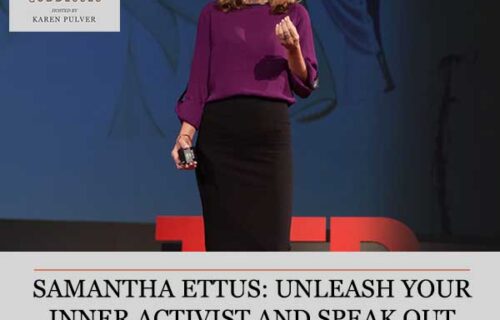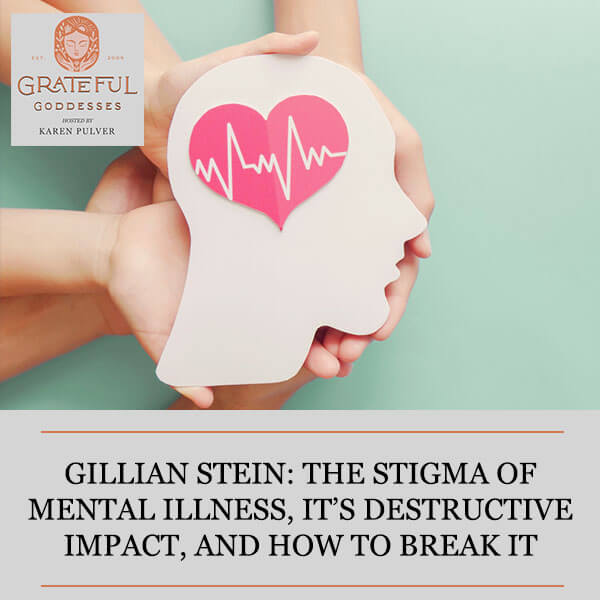
Gillian Stein: The Stigma Of Mental Illness, It’s Destructive Impact, And How To Break It
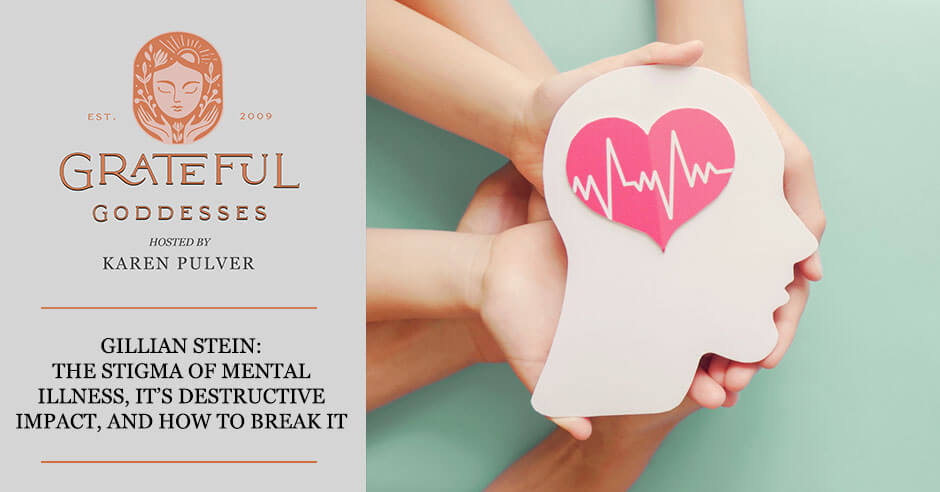
I am a broken arm, I am appendix removed, I am cancer…
When you hear that, what do you think? Take a minute… Yes, I had a broken arm, my appendix removed, and cancer but they do not define who I am. So why do people who have mental health issues often say, “I am bipolar, I am schizophrenic, I am depressed?”
There is a STIGMA associated with mental health issues.
If you are someone who is suffering from any symptoms of mental health issues, or if you know someone who is, I am hoping that this episode of Grateful Goddesses will help you to release the stigma and see there is hope and positivity ahead! If you don’t have mental health issues or know anyone, I also feel this episode will help shift your mindset and see people more clearly for who they are and not the disease that unfortunately some people feel would define them.
Our guest today is Gillian Stein. Her Grandfather in 1909 founded Henry’s camera, Canada’s leading camera chain. Gillian is the CEO and owner. She recently came out as the first Canadian CEO to share about her bipolar illness. It is her hope that others will more comfortable to “come out” and thus will get the help they need. In her words, “if we can’t share, (as a happy, successful, fulfilled family) how can we expect anyone else to share?”
—
Watch the episode here
Listen to podcast here
Gillian Stein: The Stigma Of Mental Illness, It’s Destructive Impact, And How To Break It
I am a broken arm, appendix removed and cancer. When you hear that, what do you think? Take a minute. I am a broken arm. I had a broken arm when I was twelve, sliding down the banister and fell off. My appendix was removed when I was thirteen. Those two years were tough and I had cancer several years ago. I’m cancer-free now but those episodes and occurrences in my life do not define who I am.
Why, when people have a mental illness, do some people say, “I am bipolar, schizophrenic, depressed.” There is a stigma associated with mental health issues. If you are someone who is suffering from mental health issues or if you know someone who is, I’m hoping that this episode will help you to release that stigma.
I also hope that if you do not know someone who is suffering and you see this in the news and see all the different people who might be coming, release that stigma that you may have. It is important to define people for who they are, shift your mindset and separate them from that disease that, unfortunately, they may experience. Our guest is Gillian Stein. Her great-grandfather in 1909 founded Henry’s Camera, Canada’s leading camera chain. Gillian is the CEO and Owner.
—
Welcome Gillian and also Camille, one of our Featured Goddesses, to this show.
Thank you, Karen, for having me.
I was very excited when I found your article. We want to get to know you first, Gillian. Can you tell us a bit about your background, where you were born and grew up? Are you married? Do you have kids? What did you study? What is your favorite color? Why did you stay in the family business? Do you like taking pictures, etc.?
I was born and raised in Toronto, Canada. I have left many times. I went to school and did my undergrad in Montreal. I did my Master’s in England. I spent some time living in New York. I have traveled extensively all around South Asia, Europe and South America. Travel was a big part of my life when that was something that was easy to do.
I am married. I have got two little boys, not so little anymore, 8 and 11, in 2022. I never thought that I was going to work in the family business. I was adamant that I would not, growing up and seeing how part it was for my family. Retail is a tough business to be in. There are few people who aspire to a career in retail. People tend to land in it.
I felt like my mind was betraying me, and it was a very scary place to be. Share on XMy passion is in corporate social responsibility. I did my undergrad in Business and my Master’s in International Development. That was where I wanted to spend my time. It was several years ago that I decided that it made sense for me to come back to the family business. There are lots of wonderful values in it that I felt connected to and passionate about. I felt that the experiences that I had outside could lend itself well to the business. I took over several years ago. It has been a journey.
It has been a journey especially through COVID too. From reading articles, you seemed to get through in a difficult yet positive manner in the business. Do you like taking photos?
I do not do it anymore. When I was younger, I had a dark room. I took a lot of classes and I have always been surrounded by beautiful photographers and incredibly talented artists. Most of our staff are photographers themselves. They are passionate and I’m always amazed when I see that these are the people that work for us. I’m impressed with what it is that they do. I do love it.
My husband is very artistic. He has an amazing eye. On our honeymoon, he picked up my camera and has not put it down since. He has become the family photographer. Maybe one day, when I’m older and have more time on my hands, I will be able to pick it back up again. For now, I get to enjoy his photography and he gets to capture our family. I get to live it and enjoy it.
It is interesting you say to capture. The saying a picture says a thousand words. Now with a lot of young adults on Instagram, they are posting photos of their beautiful lives and there is a lot of FOMO going on but we do not know what is going on behind closed doors. For you, if a photo was taken of you back in 1997 when you were eighteen years old in Montreal, what would that photo look like?
I was in my first year in university and I would have been looking like everybody else, having a great time in university and loving it.
However, what was the story behind the picture?
When I was in my first year of university, I struggled a lot. I had symptoms of bipolar disorder when I was in my first year in university but I was not diagnosed until many years later. That would have been the beginning of difficult times in my life some challenging experiences and a lot of depression. I had a number of manic episodes and those took hold at that time.
Can you explain what a manic episode feels like?
1-5 Canadians and Americans are diagnosed with bipolar disorder. Share on XEverybody is different but I will talk about my experience. It became apparent that I was experiencing more than the highs and lows of being a teenager. I was living in Montreal at that time and I found myself at the airport in Montreal. I was convinced, for some reason, that I was at the airport in Phoenix, Arizona.
I was looking for the bus schedules from Phoenix to Tucson which, if you were in the Phoenix Airport, would be a perfectly reasonable thing to ask for. I was looking for it in the Montreal Airport and getting upset with the staff there. They did not understand what I was talking about. I was yelling and screaming at them. It was this strange experience. I still, to this day, do not know why I was at the airport. If I was supposed to be picking somebody up at that moment, I always say, “I apologize if I did not pick you up that day because I had no idea why I was there.”
I do not remember getting there and getting home but I know that moment happened. That was my first experience of a manic episode with elements of psychosis. The definition of a manic episode is when you experience that for longer periods of time. This was a very brief period but it was real. That was a manic episode and I can’t remember what else surrounded it to be able to say what all the other things that happened were while I was having that episode.
You said the words, “It felt real.”
It felt extremely real.
No one could convince you otherwise but you did call your mom.
This is the one part that I remember is being in the airport and nobody understanding why they could not help me. At some point, I got home back to my dorm and realized that I had done something that did not make any sense. That is when I called my mom and said, “I need help. You need to come and help me.”
I understand you had bipolar family members and you grew up knowing what bipolar disorder was. In effect, there are some young adults that might be feeling these symptoms but do not want to share them with their families. Because you grew up with it, you thought, “I think I might be experiencing this.” Is that true?
I did not know that I had family members who had bipolar disorder until I was probably seventeen. Before I got diagnosed myself, we talked about mental health but never specifically. I did not know the facts. It was more that there was this sense of heightened awareness in my family but I did not know until I was seventeen that my father had bipolar disorder. I did not know when I was younger the things that I saw him doing that is what I was associated with.

My parents were very attuned to it. We still did not talk about it. I did understand what was going on. I knew that something was not right and most importantly, though, I knew that I was comfortable to call my mom. My mom was much more aware and knew that she needed to react quickly. This was not a thing to ignore. That is what was different about my family than a lot of other people.
You felt comfortable calling your mom and she knew what to do to help you. Camille has some questions for you now.
I was curious because in your article, A Life Uninterrupted: CEO of Iconic Canadian Retail Chain Opens up about Being Bipolar, you mentioned how you felt like your mind was betraying you and that it was a scary place to be. My question is thinking you were in Arizona discovering you were not, how did you start trusting yourself again or understand the trigger that might cause you to be somewhere else and realize maybe you are not where your mind is portraying that you are?
The first step at that point was they put me on some medication and that would have started to control how I felt. I spent a lot of time especially when I was younger being scared. Any moment something could happen because what I do not know is how that first moment happened. I do not know what triggered it.
As I’m older, I can reflect back. It is in first-year university. You are not sleeping a lot, stressed, anxious and not taking care of yourself. Nobody in first-year university takes care of themselves and then you add all the anxiety, stress and pressure on top of that. It must have been building but I would not have known that at that time. Now, I can say that and feel confident. At that point, to be honest, I was scared. I probably spent a lot of that first year being cautious about letting myself go too far. I would have spent more time than I would have liked to have on my own in my room where I was safe.
I wanted to mention that this interview was a very personal one for me because I suffered from situational anxiety, depression and panic attacks back when I was diagnosed with cancer. Two years after I had been fully healed physically, I started to get these panic attacks and your brain is taking over your body.
If there was less of a stigma around mental health, people would be able to get more support and help. Share on XOnce I was driving with my son and all of a sudden, I’m ashamed to say, I felt like turning the wheel and going over a bridge. My mind was like, “Do it.” I do not know if that was a delusion or anything. Looking back now, I’m thinking maybe it was. I had my heart pounding. I pulled over and I said to my son, “Drive home.” I went to seek help and realized it was situational anxiety. I needed to take medication and I’m still taking it because I tried to go off and those panic attacks come back. Your body does not always do what your mind wants it to do.
When I talked with my parents before this interview and a bit about you about bipolar, it is in my family. Many family members do have it or had it. My mother told me of several who died who committed suicide or attempted suicide. She went through the list. It is more than on my hand and the fingers on my hand. She has talked about people who had either attempted suicide or died as a result of having bipolar and depression.
I thought growing up that that person had a heart attack, that person died in a car crash or never knew quite why. I was even told my grandmother, now she died when my dad was ten but I remember growing up and my dad saying she died of a broken heart. I thought, “A heart really breaks.” These were the stories.
There is the stigma in knowing, growing up and now it is coming out that there are many people in people’s families. 1 in 5 Canadians and Americans suffer from bipolar disorder. I wanted to know from you and you did say that the impetus for you sharing your story and coming out was due to a family friend who had died. Can you share with us that story?
It was several years ago and someone that the family knew and was connected through our business, his wife, died by suicide. We went to the funeral. I remember that no one at the funeral talked about how she died. They had two daughters who were, at that time, in their late teens, early twenties, at a time when you can only imagine that you want your mother around to help you as you are launching into life. They were extremely distraught but they could not talk about it.
If we don’t talk about our experience with mental illness, then we are continuing the stigma. Share on XI could only sense the guilt that they felt in those moments you remember the last conversation you had and it is not my fault, all of those things but they could not talk about it. I remember thinking, “How do you heal? How do you recover and grieve when you can’t openly discuss why this happened?” We taking a step back is if they had been able to be more open. If there was less stigma around mental health, would this woman have been able to have gotten support and help? If somebody had been able to understand what she was experiencing, maybe this never would have happened to begin with.
I remember after the funeral, my sister, my father and I were sitting and talking, I remember thinking and saying, “If we do not talk about our experience, we are continuing the stigma. Why don’t we share?” We are a successful family that built this incredible business. We are all relatively happy and married and we are living lives and fulfilled. If we cannot share, how can we expect anybody else to share? It was at that moment that I felt convinced that I needed to share my story because if I did not, that is another opportunity that is lost.
What has been the response to your sharing?
Incredibly overwhelming, positive. I have had many people reaching out to me that either I know or I do not know, sharing their stories, explaining how it has helped them feel more comfortable, giving hope and has been amazing. Nothing negative. All the scary things that you think are going to happen are not there.
I had some questions about the medication, part of things with bipolar. There are a lot of stigmas also with even getting medication and medicated whether or not certain people, a lot of times, how they find out they are bipolar is because they are self-medicating with even narcotics and so on. That is common in Hollywood, where that is how they end up discovering they are bipolar. I’m curious. For you, what are your thoughts about being medicated in medication? Why is there this stigma about it?
I have been happily medicated for the majority of my adult life. It helps me and I do not think there is anything wrong if you talked earlier in the opening. If you have heart disease, does anybody question whether you should take medication for your heart? You would still say, “You should exercise, eat better and do all those things.”
That in and of itself is not necessarily going to make a disease go away. You also need to supplement support with medication. How I look at any mental health issue is if there is something there that can help you, you should use it. I’m a fan but I also know that medication is not easy finding the right one. I think people get frustrated and give up too early in their journey to find the right medication.

I can say for the first number of years, I did not find the right medication but that was, “I’m going to have to keep going and keep trying because I’m not willing to live with the feeling of when you are poorly medicated.” It is a terrible feeling. I’m not willing to live like that but I’m also not willing to live in that fear of at any moment, I could have another episode or be severely depressed, which is debilitating. That is my perspective. I’m also lucky that I have found a medication that works for me.
It keeps you above water when something triggers you. From my own experience, I used to get panic attacks going into elevators. I remember years before that, I’m not making fun but being, “Why are you scared of going in an elevator?” I would go in an elevator and be like, “I got to get out.” The medication helps me stay above the water. I go in, I breathe and I’m like, “I’m not going to have a panic attack.” Is that how it feels for you in a sense?
It keeps me stable and the key is I do not want to be too high and too low but I still want to have emotions. The first medication I tried was lithium and I had no emotions. That was equally as terrifying as going too high or too low. To zero emotions is a terrible place to be. You want to find that place where you feel like, “I can be happy and be sad.” You should have those feelings. You should not be neutral all the time. It is finding something that helps you find that balance.
Going back a little bit to Hollywood, I know there are a lot of different celebrities that have come out saying that they have bipolar and it goes from all the spectrums from Elon Musk, Kanye West, Demi Lavato and Frank Sinatra, a little bit of everybody. A lot of times also in the film, the way they depict people with having bipolar adds to the stigma.
What are some of the thoughts you have as far as seeing how it is used in pop culture, music, movies or even maybe in a conversation where people might, “Have you taken your medicine? Are you being bipolar?” How does that affect you? What would you like for Hollywood to know about people with mental illness? How can they step in to make sure they are not continuing the stigma and making it where more people are scared to get help or admit that they do have bipolar for fear of how that could backlash on them?
In terms of medication, you want to find something that helps you feel stable and balanced. Share on XI think your point that it reinforces this stigma is important. This idea of when people tweet, “I might be feeling a little bit bipolar now.” I do not think that is fair again. It is an illness. If you think you have an illness, you should probably go, speak to a doctor, get help and get support. I’m not sure how tweeting is something that is helping you or anybody else.
It is important that we remember that it is an illness and debilitating. To make light of it is not fair to somebody who is struggling with something. In some ways, it is glorifying something that does not deserve to be glorified. Keep going back to somebody who is struggling, not going to help them and makes them feel so much worse.
How do you think Hollywood should do a better job of representing people with bipolar, even being medicated with mental health in general?
I have never thought that much about Hollywood, to be honest. When we think about how Hollywood or any community represents diversity, we need to show a variety of real-life scenarios. When you paint anybody, it does not matter whether we are talking about mental illness, a physical illness, ethnic diversity, gender diversity, whatever it may be when you start to pigeonhole and paint this picture of any group as one, it is not right, not fair and does not help. Why would not we take the same level of effort in terms of promoting diversity when we talk about neurodiversity? It is equally as important. A more educated approach and something that is more realistic may not be as fun for a movie but there are real people behind it. I think education is important.
To remind everyone reading, you are the first CEO in Canada. Is that correct?
Yes. I have been paying a lot of attention to the business community. The business community is even farther behind. People in the business community do not talk about their own personal experiences. Even in general, depression and anxiety disorder have become much more normalized but you still rarely hear somebody who is a business leader speak about their own experiences. Even with depression, anxiety, let alone something like bipolar disorder.
I want to insert here, Camille and then you will ask your question after but I wanted to ask you. I have read that the onset can come on in your early twenties and that is a time when you are in university, you are graduating or you are trying to find yourself. The frontal lobe does not fully develop until you are 25. If you are twenty and you start experiencing manic symptoms or psychosis, there have been individuals that need to drop out of school to get help or need to put school on hold. Everything stops until you get the help that you need.
Having bipolar is an illness, and it is debilitating. Share on XWhat advice would you give to someone who is going through that and they are thinking in their mind, “I cannot tell a friend because they will think I’m crazy.” It is not like you write it on your resume. When you are interviewing, you know that you have this and it may affect work but you are not going to come out saying, “I have bipolar.” To someone who is interviewing you. If something happens in your job and you are feeling high or low, what do you do? It has a lot of questions thrown at you right now. The general theme is, what would you tell a twenty-year-old who is experiencing this in their life?
One, I would say, “Be patient. Get the help that you need and things will get better.” It does not have to control you. There is light at the end of the tunnel. The most important thing, at least for me, was finding or developing a strong support network. In my first year dealing with this and being away from home, I did not have to be a lot but I found one close friend that I could be completely open and completely honest. He supported me in the most incredible ways.
He would come with me to doctor’s appointments. Whatever I needed, he was there. Most importantly was that I could be honest with him and having that one person made a lot of difference. I would not go and tell lots of people. I would not tell somebody that if I was applying for a job, you do not need to but you need to have your people.
It is not like you would say, “I have heart disease.” You would not say that or I have cancer when you are applying for a job. You have the support system behind you. It is also empowering that you are sharing your story. I can’t say it enough because there are twenty-somethings out there who are reading this blog post.
You are married and have kids. There are some people who might be thinking, “I’m never going to get married. I’m never going to find someone who loves me for who I am. I’m never going to find a job,” but you did. The more people that come out to say their success stories and the support that they had and by you saying all the positivity that you experienced, the more people will feel safe doing it.
There is an article written in Healthy Debate. It is called Restoring Dignity: A Teenager’s Insights into Inpatient Psychiatric Admission. This is from a nineteen-year-old who shares her story. The editor’s note is interesting. Healthy Debate has agreed not to publish the name of this author over concerns the diagnosis of bipolar disorder will affect future academic endeavors. I wanted to know your comments on that and I want to read something from this individual’s article.
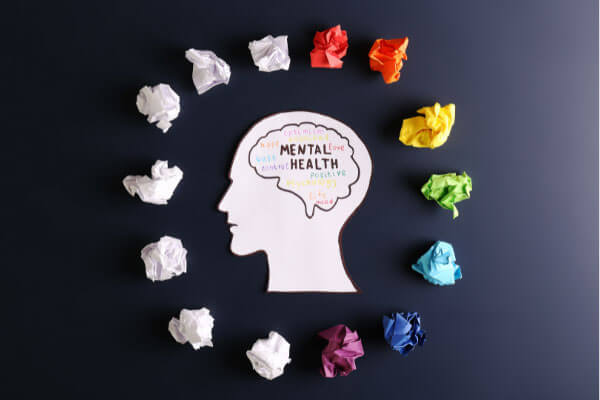
I do not know what I think about that. In nowadays’ world, that is the right thing to do. It is the reality. I would also say, “You are young.” When I was 19 and 20, I was not in a place where I could have handled that level of publicity. It is a very vulnerable place to be. I would say even for this young woman’s own mental health is probably the right thing. She does not have to experience that. She is a little bit protected but the reality is until we get farther along in terms of destigmatization.
When you are older and you have been having all of that support like you did, perhaps more people will come out. Maybe in time, twenty-year-olds will be able to come out and say it with pride and with like, “I’m okay, people are not going to turn against me, hopefully.” What I wanted to read in this article is she does talk about care and her experience in the ER.
This is the paragraph, “Now I have withdrawn from a semester of university. What I lack in traditional education, I have gained in firsthand experience. I have learned about the gaps in acute psychiatric inpatient care, which I hope to somehow improve in the future. I’m learning how to take on a new lifelong illness in stride, knowing that the illness will present its challenges but that I have the potential to live a fulfilling life.
This I cannot undertake on my own. It will take a supportive team of nurses, psychiatrists, friends and family to give me the tools to live with bipolar disorder.” She also goes on to talk about having to wait a long time in the emergency room. This is a certain system in Canada and in the United States. We may have some of the same issues and I know that you have read it but I would love to know your thoughts on this article.
It is emotional. I thought that this young woman was brave. I was so impressed articulate writing about her experience, which I can only imagine was extremely traumatizing. Many things come to mind. Number one, the comments about the gaps in our system. I do not know what it is like in the US but in Canada, getting support for mental health is hard. The access is limited, we do not have enough support and there is not enough education.
It is a very emotional article and I recommend people to read it, how brave this individual was. When I read this article, it led me then to find your article and interview you.
The earlier you can get the support, the greater the chances that you won't relapse. Share on XEven though she did not share her name, which was not important, it was about sharing the story. If by sharing the story, it is starting the conversation, led you down a path and hopefully leads other people down a path. I am so amazed at this young woman for what she has done but it should not happen. This is the year 2022. This should not happen.
Hopefully, her article call will help with the systems and other people who speak up about the systems. The whole idea of having that support system in place is key. You are working on many great initiatives that Camille would like to ask you about.
Please tell us about your new Henry’s Foundation and the Uncaptured Moments campaign.
The Henry’s Foundation is run by my sister and we work closely together. There is an important partnership between the foundation and between the business. This was that same day when we sat down after the funeral and said, “We need to do something about this.” This was also when we decided that we needed to focus our efforts around community giving specifically around mental health and lead the foundation to eventually start the foundation.
The foundation is in support of mental health supporting Canadians across the country. We are focused on destigmatization and early prevention. An important part of our family’s story is that the earlier you can get support, the better chances you have of managing, not relapsing and living a healthy life. We want to also use Henry’s in photography, videography and content creation. What we focus on is there is a real tie between creativity, expression and mental health.
We also run programs ourselves to try and connect those two. This is where Uncaptured Moments come in. #UncapturedMoments is a social media campaign. We are encouraging people from all walks of life to post the real moments in their life. One of the challenges to social media is it is always these perfect moments.
You are looking your best and having the best time with your friends. Everything is perfect and curated, though. It is not real. We know that social media can have some negative impacts on your mental health, on young women and how they feel about themselves. There are lots of great things from social media but we know that there are a lot of downsides. With this, we want people to share the real moments and how they are feeling. We all need to see what is real. If you follow the hashtag, you will be able to see people posting and talking about their experiences. It is real, raw, vulnerable and beautiful.
I would tell a 20-year-old who is experiencing having bipolar, “Be patient. There is a light at the end of the tunnel. Find a really good support network (family or friends), get the help you need, and it will get better. It does… Share on XI was going to say, “It is not necessarily sad and depressing. It is beautiful real-life moments.” People need to share unfiltered. Thank you so much, Gillian, for joining us. I feel like this episode is going to help many people to reach out and get support. If you are suffering from any mental illness that you are not sure about or you are coming from a place of questions, please reach out. I will have many different sites that you can reach out to.
The Suicide Prevention Lifeline is always available and you can also contact me, Karen@GratefulGoddesses.com, if you would like some more resources but Gillian, thank you so much for bringing this out and coming out with your story. We are grateful that you joined us. Thank you.
Thank you for helping me share my story.
—
Welcome to Favorite Things on Grateful Goddesses with our guest Gillian Stein. I did take a photography class and I was the worst student because we would put our photos up. The homework would be to use a manual, you have to take photos blurry in the distance and all of these different projects. We put them up, would go up and rate each other’s photos. I realized, “Who cares?” I like taking pictures and capturing moments.
Many of us have these types of frames in our homes that have multiple photos that we captured. These were my kids when they were younger. My son here is now 27 in 2022 and he was engaged. This is my daughter making a snowman when she was five. There is my baby, who is now twenty in 2022. These were fun times capturing their first day of school, a dance class, the first snowman, an American girl.
My aunt is a photographer. She used to capture us when we did not know and we were not looking. These are the types of photos that she would do. This is me playing in a playground. I remember that she was like, “Look here,” and I was laughing. I love those types of photos and how they capture those beautiful moments. Camille, what did you bring that makes you happy that you would like to share?
I brought the whole kitten caboodle. I brought my camera back for the same reason that you mentioned your aunt that would capture moments and people were not looking. That is me to the T. Every family gathering, party or whatever, I bring this bag. It is got my trustee dusty Nikon in it. I have two cameras in it, one for my daughter and one for myself. If she feels the need to want to capture as well, it is my first camera.
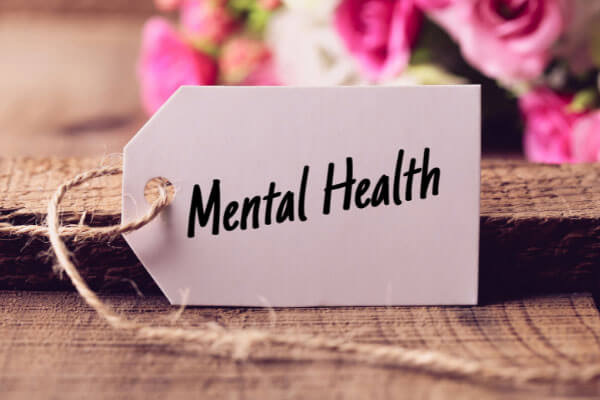
She goes around so I can get her perspective of things. It is fun for me to go out in nature, take pictures or take family pictures. It started because when I had my daughter, I was obsessed with her. I was constantly taking pictures of her with my phone and I would post them. One of my girlfriends was like, “You need a real professional camera.” She bought me one as a gift. I started taking classes and learned all the depth of field.
I could not even remember what it was called. I was blurry in the background. That is what bad I was.
I’m dyslexic. All that F-stop stuff was the problem for me. I’m like, “What is this?” I’m going to turn it until it looks right and that is what it is going to be. I see how it comes out and I hope it is for the best. To this day, Adobe is way too hard for me. I do not edit beyond cropping, speaking of unfiltered. My favorite thing is the turquoise blue camera bag that I carry with me everywhere that I go. Every vacation, everything.
You have no idea how happy you made me. That is beautiful.
Did I make you unhappy?
I’m going to share my favorite thing. It is not a camera. I was not able to cue this so I could get the live one. I’m going to share a photo or something that brings me happiness and joy. I love my children. I do deeply but there is something about my dog. This is my Luna and she is a bundle of happiness. Luna is almost two in 2022.
What I love about her is there is no judgment. This is with any dog or any animal. She does not ask me questions and tells me about what I did wrong during the day or my makeup is not right. She is just there. She can sense when you need to pick me up. She knows when you want to snuggle. The other thing that I love is that she gets me out.
We go for a number of walks a day. The thing about her is she is the friendliest dog ever. She will go up to any stranger and start to jump. Because she is little, it is fine. She does this little dance and everybody gets so happy. I feel like when I go out with her, I’m bringing joy everywhere I go because everybody gets excited. It changes the mood. No matter what’s going on in my life, I can spend some time with her and take her for a walk. Not only am I making myself happy, I’m making other people happy. That is what I wanted to share.
Camille and I both have dogs. We are dog lovers. With COVID, did you know that there were many pets that were purchased? Many people got pets to help them through. It is interesting because pets do not judge, they are helpful to individuals that are feeling sad and they pick up on those emotions. When I’m feeling sad, my dog will often come to snuggle near me and I’m like, “Thank you, you understand.”
He gets it. We love our pets. We love our dog very much. It brings so much joy, picks up on emotions, helps you to stay balanced and stay calm, gets you going and gets you going outside. Thank you so much for sharing, Luna. She looks cute and thank you again for sharing your story. Enjoy your day. Thank you.
Important Links
- Henry’s Camera
- A Life Uninterrupted: CEO of Iconic Canadian Retail Chain Opens up about Being Bipolar
- Restoring Dignity: A Teenager’s Insights into Inpatient Psychiatric Admission
- Henry’s Foundation
- Uncaptured Moments
- The Suicide Prevention Lifeline
- Karen@GratefulGoddesses.com
About Gillian Stein
 Gillian Stein is the CEO of Henry’s, the largest independent digital imaging retailer in Canada. Under her leadership, Henry’s has undergone a transformation from a traditional electronics retailer into one that encourages and builds on our customers’ creativity and passion. Their evolution includes delivering the best specialty retail experience across Canada, driving innovation to meet the future needs of our customers, expanding the brand to connect with the rapidly growing segment of content creators, including podcasters, YouTubers, and other digital storytellers, and re-inventing the digital imaging category to take the business to greater heights.
Gillian Stein is the CEO of Henry’s, the largest independent digital imaging retailer in Canada. Under her leadership, Henry’s has undergone a transformation from a traditional electronics retailer into one that encourages and builds on our customers’ creativity and passion. Their evolution includes delivering the best specialty retail experience across Canada, driving innovation to meet the future needs of our customers, expanding the brand to connect with the rapidly growing segment of content creators, including podcasters, YouTubers, and other digital storytellers, and re-inventing the digital imaging category to take the business to greater heights.
As a people-first leader, it’s important to her that her role extends well past driving the bottom line. Corporate social responsibility and employee well-being are critically important to her, Their success as a business and members of the community. She is a proud board member of the Henry’s Foundation, a non-profit charity that supports the improvement of mental health for Canadians everywhere.
She has a master’s degree in International Development from the University of Sussex in England, a Bachelor of Commerce from the University of McGill, and is a certified Project Management Professional (PMP). In addition to the Henry’s Foundation, she also sits on the Board of the Retail Council of Canada (RCC) and the Maple Leaf Chapter of the Young Presidents Organization (YPO). She lives with her husband and two wonderful sons in Toronto. In her free time, you can find her traveling and exploring the globe, being a foodie, and spending time outdoors with her family.


